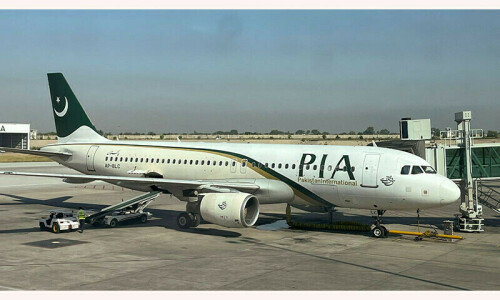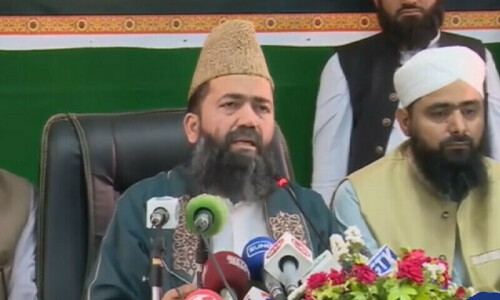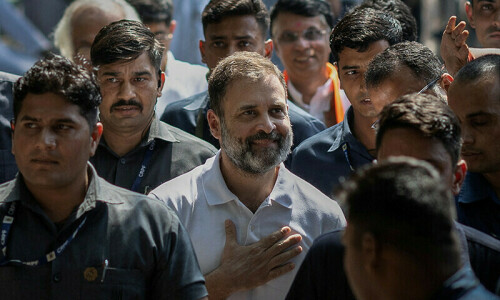 KARACHI, July 30: No progress has been made on the project of computerization of the record of the zoology museum at the University of Karachi for almost three years. The reason for this delay is reportedly the lack of interest on part of the department chairperson and the staff.
KARACHI, July 30: No progress has been made on the project of computerization of the record of the zoology museum at the University of Karachi for almost three years. The reason for this delay is reportedly the lack of interest on part of the department chairperson and the staff.
According to sources, the project was initiated by the former chairperson of the zoology department, Dr S. Nazneen Rizvi, in 2003.
The project was aimed at making the information available not only on compact disks but also accessible through the museum’s website on the internet. The project was formally inaugurated by the KU vice-chancellor, Dr Pirzada Qasim, a year later in September.
The computational work for the project was carried out by Dr Rukhsana Parveen, Dr Rahila Tabassum, museum taxidermist Munawar Bukhsh, Mohammad Shafiq, Azhar Ali Khan and Riaz Ahmad Siddiqui, under the supervision of the then chairperson.
Sources in the department told Dawn that around 75 per cent of the work on the project had been completed during the tenure of Dr Rizvi. Since her retirement in 2004, the project had been in a limbo apparently due to the lack of interest of the departmental heads who came afterwards, they said.
Commenting on the current status of the project, a taxonomist at the department, Dr Rukhsana Parveen, said that keeping in view the size of the project, more manpower was required for its completion.
“After the departure of Dr Rahila Tabassum, I am the only one left to look after the job”, she said.
Established in 1952, the museum of the KU’s zoology department holds an important position among the museums of all the private and public sector universities in the country as it is considered to have the largest collection of specimens, including, 300,000 insects, 525 microscopic slides of fauna, 14 skeletons, specimens of 113 eggs, 77 skulls, 612 specimens of aves, 105 reptiles, 120 fish, mollusc and 30 specimens of amphibia. Besides, graphic representation of faunal groups, including, protozoans, cnidarians, nematodes, molluscs, arthropods, fishes, reptiles, mammals, poriferans, platyhelminths, echinoderms, annelids, protochordates, amphibian, aves, inverteberates and insects. Among this large repository of specimens, a large collection belonged to the British Museum which was initially brought to the Frere Hall museum under a research project during the pre-partition era. Later, the collection, many of them a century old, was handed over to the KU’s zoology department. This includes stuffed animals like tiger, a Himalayan bear, a Bengal tiger, a leopard, a lion-tailed monkey, a baboon, a porcupine, a giant anteater, a houbara bustard, a crocodile, an alligator and skeletons of a whale and a horse.
About the significance of the computerisation of the data, a teacher at the department said that it could prove to be of great benefit to the zoology students as there was not a single standardized zoology lab in other educational institutions of the city and students had to visit the university if they wanted to study a particular specimen.
“Reference museums are very important in research as they are used for identification of specimens. Once all the specimens are identified, catalogued and available on the Internet with brief details about their history, basic features and habitat, the department can generate income from this source,” she said, adding that the identification of specimen was supposed to be the fundamental job of any institution of zoology but had been ignored at the university.
“Students are asked to do research from physiological and bio-chemical aspects, but no attention is being paid to make students learn how to identify specimen and that is the reason the museum is being neglected. Not surprisingly thus, we have very few zoologists in a real sense and hardly any ornithologist,” she regretted.
Dr Afzal H. Qadri, the founder of the department, and Dr Hamid Mahmood, a former chairman, are said to have contributed a great deal towards the uplift of the museum. But after the end of their respective tenures, the museum underwent only minor changes and no significant addition to its collection took place since then.
It is said that during the periods of the above-mentioned individuals, the department had bagged a number of research projects even from foreign institutions. But the situation has changed for the worse.
Since the museum is no more a priority, one can see many exhibits in bad shape. Many bones from the whale’s skeleton are missing and the rest is randomly stored in cupboards. One also finds it hard to clearly view the many exhibits stored in glass cases in the basement as the glass has become stained over the time and obstructs vision.
Though fumigation is carried out periodically, there is no permanent caretaker. The department has done little to facilitate school and college students, who frequently visit the museum.
“Most of the visitors come during winter as there is no air-conditioner or even a fan in the basement which turns into a living hell during summer,” remarked a student.
The department sources said that three air-conditioners and some fans were installed in the basement some years ago but were removed on different pretexts.
A student said that the departmental head was of the view that the exhibits could get damaged due to the moisture produced by the air-conditioners. However, he added, somebody should inform the authorities concerned that air-conditioners were used in museums all around the world.











































Dear visitor, the comments section is undergoing an overhaul and will return soon.